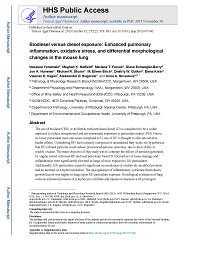Mining Publication: Biodiesel Versus Diesel Exposure: Enhanced Pulmonary Inflammation, Oxidative Stress, and Differential Morphological Changes in the Mouse Lung
Original creation date: October 2013
Authors: N Yanamala, MK Hatfield, MT Farcas, D Schwegler-Berry, JA Hummer, MR Shurin, ME Birch, DW Gutkin, E Kisin, VE Kagan, AD Bugarski, AA Shvedova
The use of biodiesel (BD) or its blends with petroleum diesel (D) is considered to be a viable approach to reduce occupational and environmental exposures to particulate matter (PM). Due to its lower particulate mass emissions compared to D, use of BD is thought to alleviate adverse health effects. Considering BD fuel is mainly composed of unsaturated fatty acids, we hypothesize that BD exhaust particles could induce pronounced adverse outcomes, due to their ability to readily oxidize. The main objective of this study was to compare the effects of particles generated by engine fueled with neat BD and neat petroleum-based D. Biomarkers of tissue damage and inflammation were significantly elevated in lungs of mice exposed to BD particulates. Additionally, BD particulates caused a significant accumulation of oxidatively modified proteins and an increase in 4-hydroxynonenal. The up-regulation of inflammatory cytokines/chemokines/growth factors was higher in lungs upon BD particulate exposure. Histological evaluation of lung sections indicated presence of lymphocytic infiltrate and impaired clearance with prolonged retention of BD particulate in pigment laden macrophages. Taken together, these results clearly indicate that BD exhaust particles could exert more toxic effects compared to D.

- Aerosols Emitted in Underground Mine Air by Diesel Engine Fueled with Biodiesel
- A Computer Software Program that Estimates Air Quantity Requirements in Large Opening Stone Mines
- Diesel Exhaust Aerosol, Review of Measurement Technology
- Effectiveness of Iron-Based Fuel Additives for Diesel Soot Control
- Effectiveness of Selected Diesel Particulate Matter Control Technologies for Underground Mining Applications: Isolated Zone Study, 2003
- The Effects of Water Emulsified Fuel on Diesel Particulate Matter Concentrations in Underground Mines
- Instrumentation for Diesel Particulate Matter Emissions Research
- Mutagenicity of Biodiesel or Diesel Exhaust Particles and the Effect of Engine Operating Conditions
- Mutagenicity of Diesel Exhaust Particles from an Engine with Differing Exhaust After Treatments
- Technology News 514 - The Air Quantity Estimator (AQE): A New Computer Software Tool for Large-opening Mine Ventilation Planning